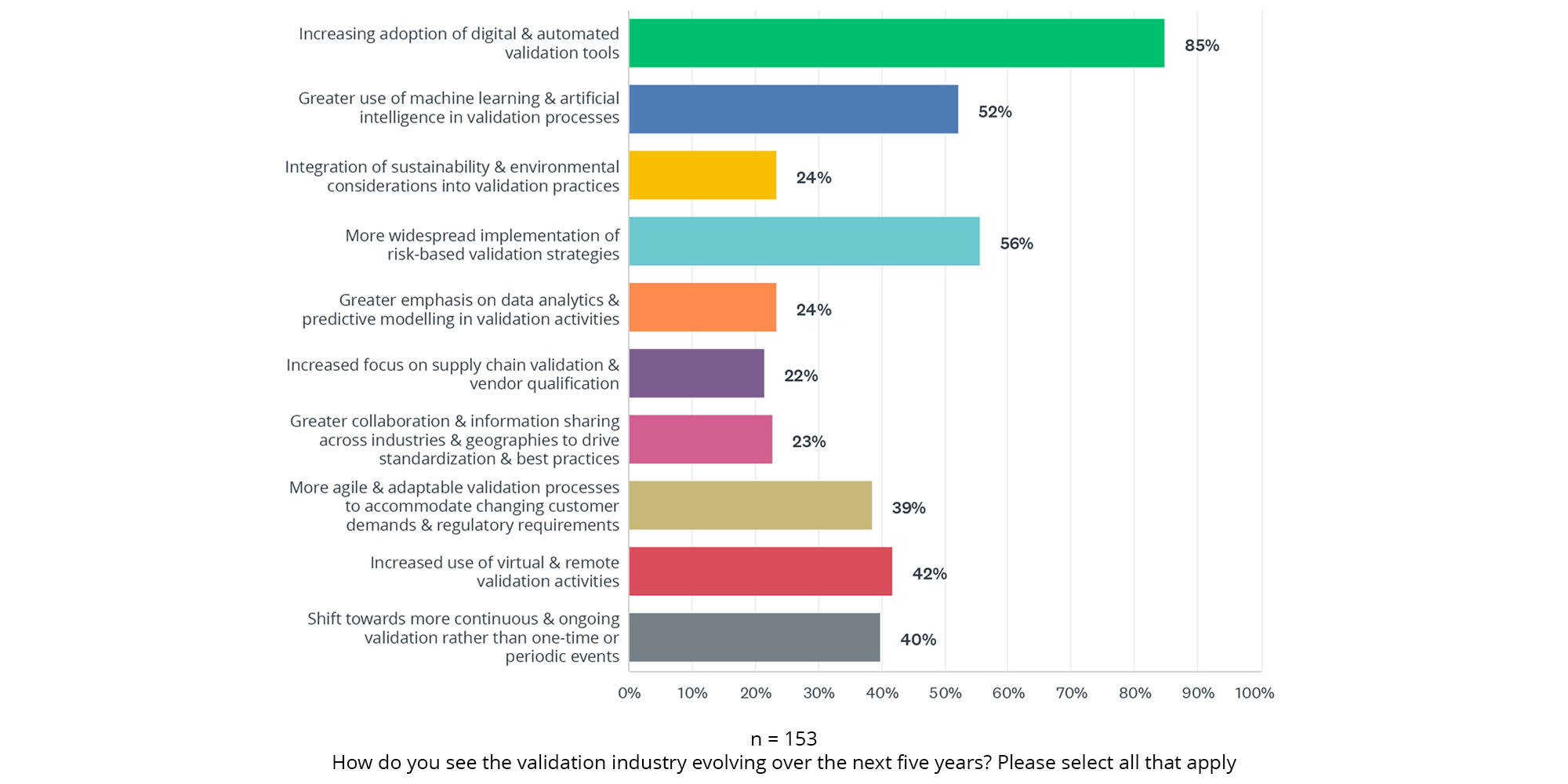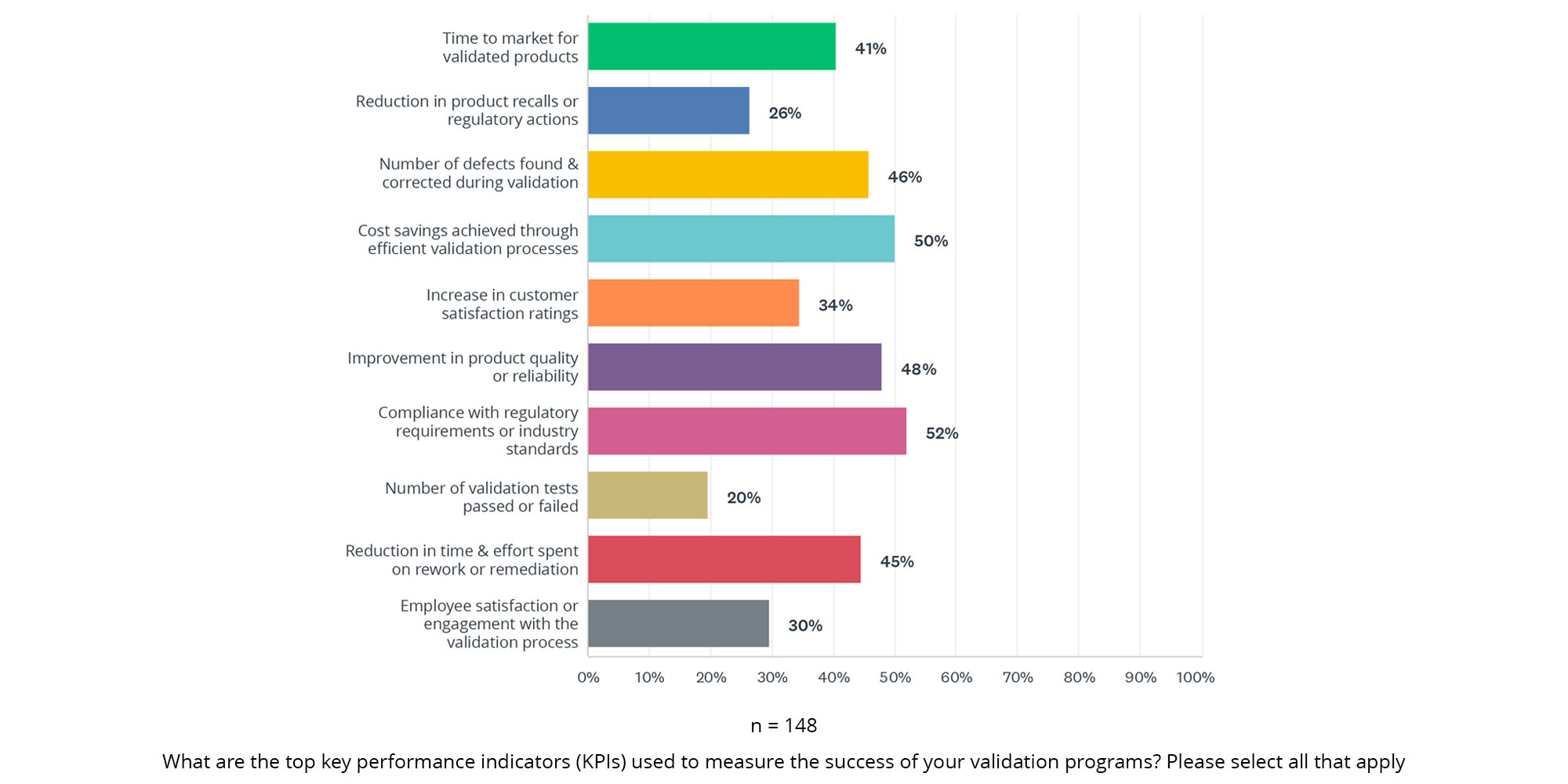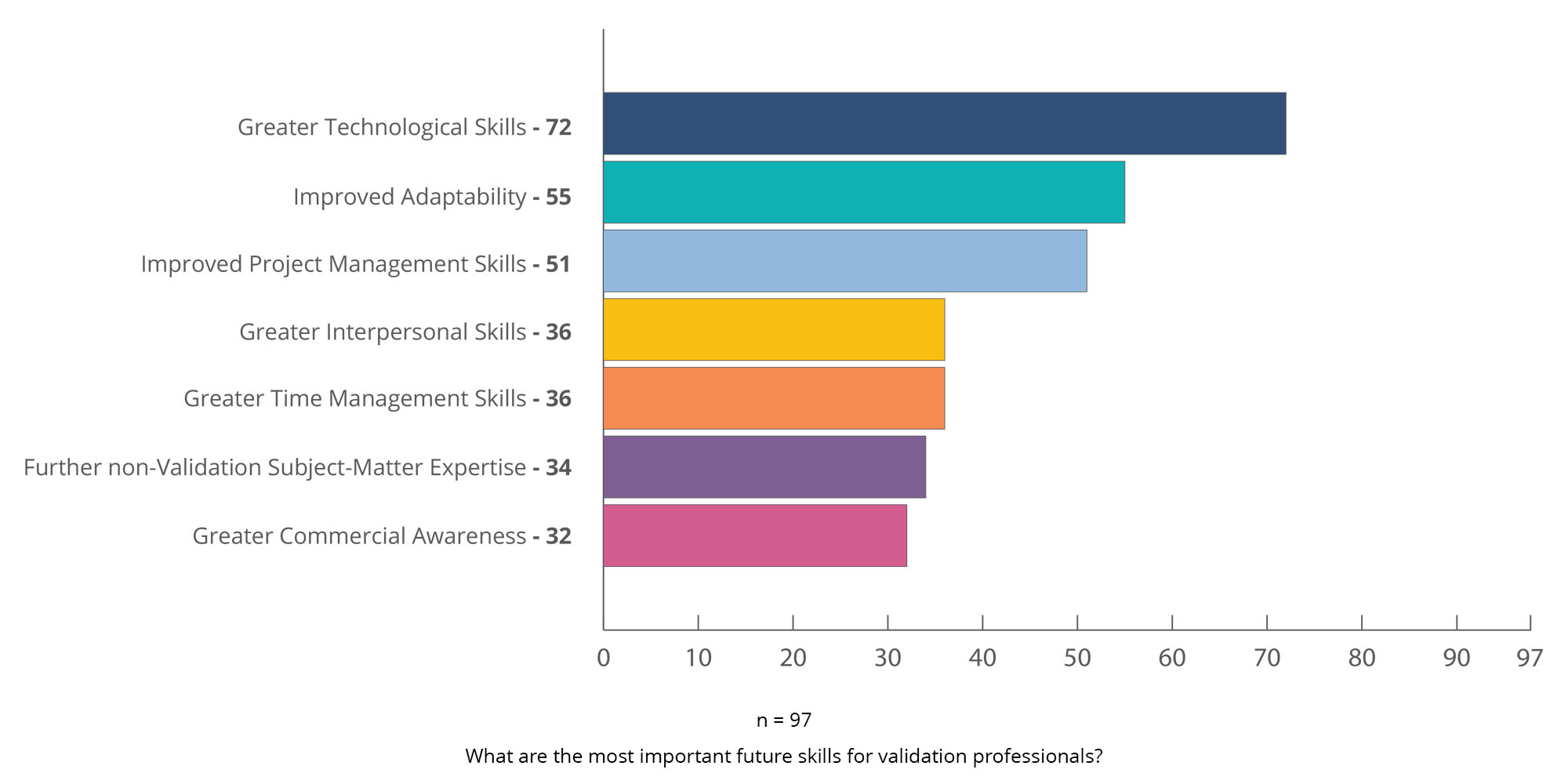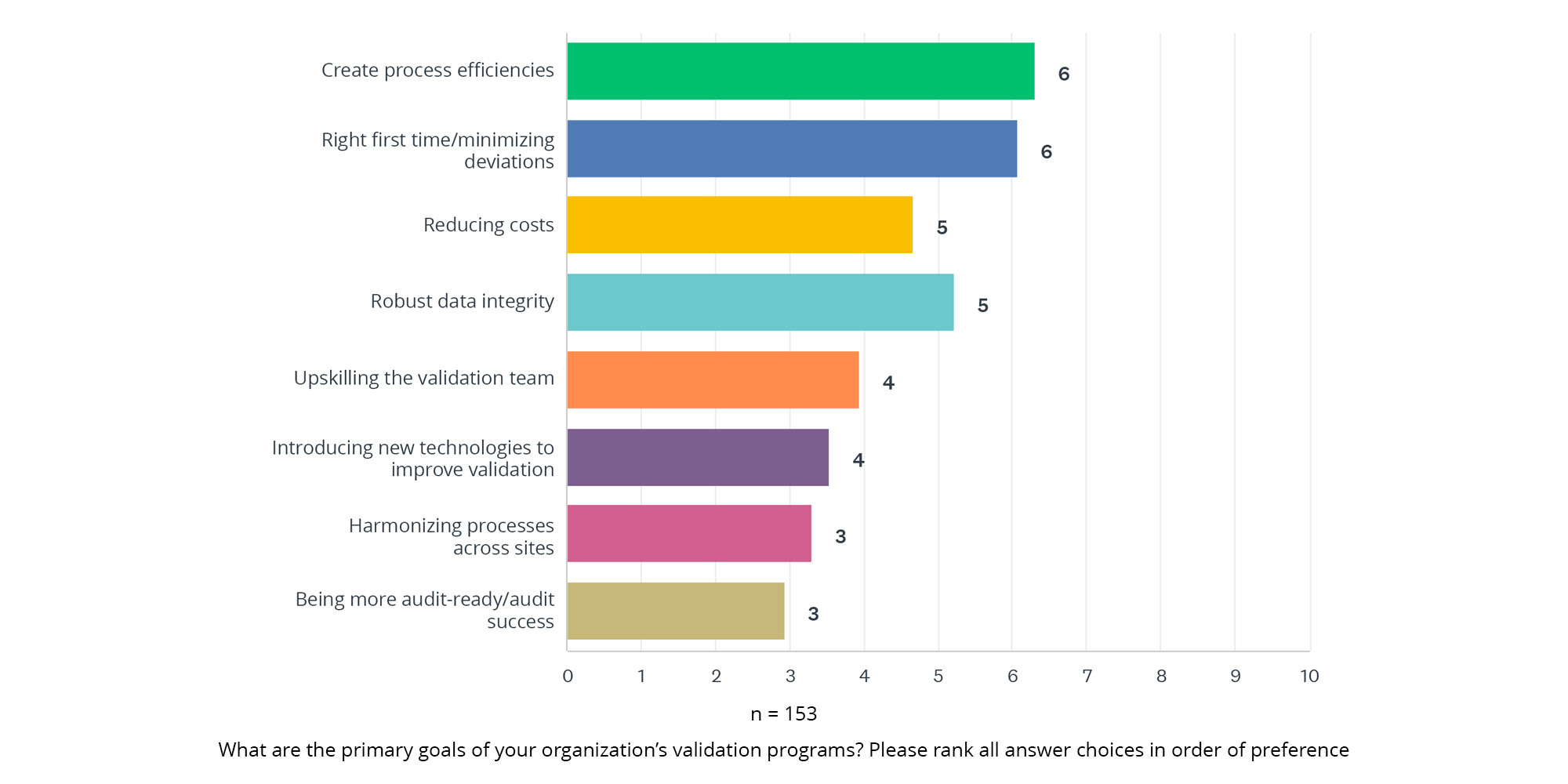In the dynamic landscape of the validation industry, staying ahead of the curve is essential for professionals looking to thrive in their careers. The year 2024 brings new challenges and opportunities, requiring validation experts to possess a diverse set of skills. In this article, we’ll explore five in-demand skills that validation professionals have highlighted in recent State of Validation industry reports and provide insights into how professionals can sharpen their capabilities and make a significant impact in the field.
1. IT Skills and Digital Validation
As technology and the movement towards Pharma 4.0™ continues to evolve at an unprecedented pace, validation professionals working in the life sciences industry must stay abreast of the latest developments and acquire relevant IT skills. The ability to navigate through various software tools and maintain data integrity principles is crucial in ensuring the accuracy and reliability of all validation processes. For Computer System Validation (CSV) and Computer Software Assurance (CSA) validation processes, validation professionals must also be able to interpret complex algorithms and programs.
According to the 2023 State of Validation survey, a vast majority of respondents, 85%, foresee an increasing adoption of digital and automated validation tools in the next five years. This suggests a growing recognition of the potential benefits that digitalization and automation can bring to the validation processes. These tools are expected to enhance efficiency, accuracy, and overall effectiveness in validation activities.

Figure 1
The survey also reveals that 52% of respondents anticipate a greater use of machine learning and artificial intelligence (AI) in validation processes. Machine learning and AI technologies offer the potential to automate data analysis, identify patterns, and optimize validation activities in terms of quality and efficiency, based on a training set of data and experience. This trend suggests that the industry is acknowledging the transformative potential of AI in streamlining validation practices.
In 2024, employers are seeking candidates proficient in emerging technologies such as artificial intelligence, machine learning, and blockchain. A solid foundation in digital validation technology can set validation professionals apart. Understanding how to leverage supplier activities and testing and validate computer systems and processes has become a core competency, making it essential for individuals to be adaptable to technological advancements in the ever-evolving digital landscape.
Start and advance your digital validation training with robust training programs tailored to users’ needs at Kneat Academy.
2. Communication Skills
Effective communication has always been a cornerstone of success in any industry, and the validation sector is no exception. In 2024, the ability to communicate clearly and concisely is more critical than ever. Validation professionals interact with various stakeholders, including regulatory agencies during audits and inspections, cross-functional teams, and management.
When 2023 State of Validation survey respondents were asked how they saw validation industry evolving over the next five years “Increased Use of Virtual and Remote Validation Activities” was selected by 42% of respondents (see Figure 1 above). This indicates a trend toward conducting validation activities remotely, possibly driven in part by COVID-19 and the need for remote and paperless validation and by technological advancements and the need for more flexible and adaptable validation practices.
During the COVID-19 pandemic, the U.S. Food and Drug Administration (FDA) needed to adapt to health recommendations like facility closures and social distancing while still overseeing the production of food and drug products the public used daily. The solution was Remote Regulatory Assessments (RRAs). In late 2023, the FDA announced it will be continuing its use of RRAs beyond the pandemic and will be expanding their use.
Clear communication is necessary for explaining complex technical concepts, reporting validation results, and collaborating with team members. In an era where remote work is prevalent, virtual communication skills, including proficiency with collaboration tools and video conferencing, are increasingly valued. Employers are seeking candidates who can bridge the gap between technical expertise and effective communication, fostering collaboration and understanding across diverse teams.
3. Results-Oriented and Reporting Skills
Validation professionals are the gatekeepers of quality assurance in regulated industries. Being results-oriented is not just about completing tasks but ensuring that each validation effort aligns with the overall goals of the organization. This includes a deep understanding of regulatory requirements, compliance standards, and the ability to deliver outcomes that contribute to the company’s success.
According to the 2023 State of Validation report, the top key performance indicator used to measure success of validation programs is “Compliance With Regulatory Requirements or Industry Standards” (52%). This indicates that ensuring compliance with regulations and industry standards is a top priority for organizations in their validation programs.
The second most prevalent KPI is “Cost Savings Achieved Through Efficient Validation Processes” (50%). Organizations are actively seeking ways to optimize validation procedures to reduce costs and resource utilization. Digitalization and automation can lead to gains in productivity and cost benefits or cost savings.

Figure 2
Effective reporting skills are becoming increasingly critical. In 2024, employers value professionals who can translate complex technical information into comprehensive reports that stakeholders can easily comprehend. A keen eye for detail, data visualization proficiency, and the ability to articulate findings in a clear and concise manner are vital skills for validation experts aiming to drive informed decision-making within their organizations.
Kneat’s digital validation platform, Kneat Gx enables users to run status reports for all projects, systems, and validation deliverables. Users can run an overall report, create a report using filters, save a filtered report and export the report to PDF. Paperless handover makes it easy to present documentation outside of Kneat Gx —perfect for administrative tasks— while including a full audit trail of all activities. Download our Kneat Gx Solution Overview to learn more.
4. Organizational Skills: Time Management, Task Prioritization, and Multitasking
The fast-paced nature of the validation industry demands professionals who excel in organizational skills. Time management, task prioritization, and multitasking are essential components of a successful validation career. With multiple projects running concurrently and stringent deadlines to meet, validation experts must navigate through complex schedules efficiently.
In the 2022 State of Validation survey, respondents were asked to select all skills and/or attributes they thought validation professionals would need to best match how validation is performed. The most prevalent skill/ attribute selected was “Greater Technological Skills,” followed by “Improved Adaptability,” and “Improved Project Management Skills.”

Figure 3
Time management involves allocating resources effectively, ensuring that each validation project progresses according to the timeline. Task prioritization is about recognizing the critical elements of a project and addressing them first, preventing bottlenecks in the validation process. Multitasking, while maintaining the quality of work, is a balancing act that professionals must master to thrive in the demanding environment of validation.
5. Bias for Documentation and Accuracy
Documentation is the backbone of validation processes. A meticulous focus on documentation and accuracy is paramount. Validation professionals must create, update, and maintain comprehensive documentation that complies with regulatory requirements. This includes validation plans, protocols, test scripts, and reports.
Our webinar, “Plan, Elevate, Validate: An Expert Take on Mastering Validation Plans” guides you through the intricacies of creating a robust Validation Master Plan (VMP) and Validation Plan (VP). Whether you’re new to validation planning or seeking to enhance your existing strategies, this webinar is your gateway to practical knowledge and expert strategies. Watch now
In the 2023 State of Validation survey respondents were asked to rank the primary goals of their organization’s validation programs. The top 3 goals “Create Process Efficiencies,” “Right First Time/Minimizing Deviations,” and “Robust Data Integrity,” collectively emphasize the strategic importance of validation. The alignment of goals reflects a holistic approach to validation practices. Organizations prioritize not only process optimization but also accuracy, compliance, and data integrity to ensure a well-rounded and effective validation program.

Figure 4
A keen eye for detail ensures that no aspect of the validation process is overlooked, reducing the risk of errors and ensuring compliance with industry standards. Employers seek candidates who approach their work with a commitment to precision, understanding that thorough documentation is not just a regulatory requirement but a fundamental aspect of ensuring the reliability and traceability of validation activities.
Kneat Gx’s Document Management Module allows you to access GxP and non-GxP documents in one secure, compliant platform to reduce barriers for product teams so they can focus on enhancing product quality and accelerating production.
Final Thoughts
The validation industry is evolving, and professionals need to adapt to new challenges and expectations. In 2024, the most sought-after validation experts possess a combination of IT skills, results-oriented and reporting capabilities, organizational prowess, effective communication skills, and a strong bias for documentation and accuracy. By honing these skills, validation professionals can position themselves as indispensable assets to their organizations and excel in an industry that continues to push the boundaries of technological innovation and regulatory compliance.
Share Your Voice in the 2024 State of Validation Survey
The State of Validation is an annual report, powered by Kneat Solutions, comprising primary research conducted with validation professionals worldwide.
The State of Validation survey creates an annual dataset which is analyzed and published in the report together with expert, actionable insights, which track the progression of the validation industry, enabling organizations and individuals to inform their own programs and initiatives, benchmark, adapt, and grow.
We are inviting all global validation, quality, and compliance professionals, service providers, and academics who work in highly regulated industries to take part.




